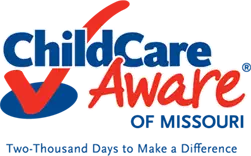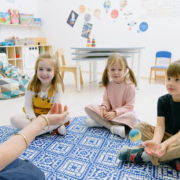The Top Benefits of Child Care Professional Training
 We live in a society that doesn’t always value child care professional training. There’s a pervasive cultural myth that child care providers are glorified babysitters and that pretty much anybody could do a fine job. That’s simply not true. Just like any other professional, child care providers need specialized training in order to do the best possible work.
We live in a society that doesn’t always value child care professional training. There’s a pervasive cultural myth that child care providers are glorified babysitters and that pretty much anybody could do a fine job. That’s simply not true. Just like any other professional, child care providers need specialized training in order to do the best possible work.
Extra training isn’t the easiest sell for some people. It takes valuable time, and it might cost some money to get into certain training programs. However, those costs are definitely worth the end result.
Here, we’ll try to convince you of that. We’ve broken the different benefits of child care professional training into the different groups it helps, detailing how each segment of the population has something to gain from increased training in whatever form that takes, from college courses to on-demand child care training. Those groups range from very specific, like parents and children, to very broad, like society at large. By the end, you should realize that everyone has something to gain from increased child care professional training.
Benefits to Child Care Facilities
Child care centers and other types of child care facilities might not see the immediate benefits of providing child care professional training for their employees. After all, if they were qualified enough to get the job, how much more training could they actually need?
Turns out, quite a lot.
Exceed Expectations
First of all, not all states have very strict requirements for the amount of training required for all entry-level child care workers. In Missouri, not all child care providers are required to have a license — namely, religious organizations and small, in-home child caregivers. The state of Missouri requires caregivers in licensed child care facilities to complete 12 clock hours of training each year. However, if you’re working in one of these license exempt settings, you’re not required to take the trainings that others are. So, a baseline qualification often doesn’t really cut it in terms of giving potential clients peace of mind.
This is all to say that especially if you run a license-exempt operation, offering and encouraging more training can help you stand out from the pack. Just because it isn’t required by the state doesn’t mean it’s not a good idea.
Keeping Up with the Industry
Perhaps an even more important reason, though, is that the child care world is always changing. New research uncovers new best practices, and new data informs new rules and regulations. It’s important to keep up. Child care professional training is one of the best (and only) ways to make sure your staff is studying up on any new recommendations or methodologies.
Attracting More Business
Keeping your staff well educated with child care professional training will also make your facility more attractive to parents looking for a trustworthy place to care for their children. We’ll talk more about how parents benefit from child care professional training in a little bit, but it’s worth mentioning here that parents definitely care about child care professionals’ backgrounds. If they’ve done their homework, they’ll likely ask about it before enrolling their children. Child care providers will want to have a good answer for their questions about the level of child care professional training offered to their staff.
In-Person Trainings
So, this is all to say that it pays to have a well-trained staff, and making that training accessible to them is one way a child care center can increase the level of child care professional training among its workers. On-demand child care training definitely has its benefits and is appropriate in some settings, but one of the main benefits of child care professional training provided by a child care facility is that it can be in person. If you offer up your space to a seminar, then that makes getting hands-on training that much more accessible for your employees.
Benefits to Child Care Providers
Of course, one of the main benefits is compliance with the law. Missouri child care workers need to log 12 clock hours of training each year, and if you live in another state, you should definitely check out the requirements in your area. This is one area where on-demand child care training can be super helpful. In Missouri, you can go to the Department of Elementary and Secondary Education’s Office of Childhood website and find various on-demand child care training courses you can take to count toward those annual hours.
Increased Earning Potential
Especially if you earn a prestigious form of child care certification or degree, you’ll qualify for higher paid positions, and you’ll have the leverage to negotiate a higher salary. The more training you’ve gotten, the more you’re potentially worth to a child care facility.
In addition to simple courses like on-demand child care training, you can go after well-respected certifications. One of those is the Child Development Associate Credential. It’s a fairly involved process, and although it’s not as accessible as something like a basic on-demand child care training class, it can definitely be attainable. Learn how we can help you earn your CDA here.
New Opportunities
How many new positions you become qualified for after you complete some training will largely depend on what kind of training it was, but the point stands that generally, the more knowledge you amass, the more different kinds of positions you can excel in.
Maybe you’ve been a child care worker for some time now, and you’re interested in moving into a different role in that sector. Gaining a new position will likely be a lot easier with the right kind of education under your belt. One on-demand child care training class isn’t going to change your life or your prospects, but it might open some doors to other types of experience you can get.
Benefits to Children
How children benefit from child care professional training should be pretty obvious. We’ll explain it in detail anyway, though, because we’re nothing if not thorough.
School Readiness and Lifelong Success
When those kids get higher quality child care, they have a better chance at success. The best early childhood care will help young kids gain communication and social skills, early math and pre-literacy knowledge, and foster healthy brain development. They’ll also be more aware of the roles different people play in the world around them. Early childhood is a critical period in brain development, and making sure kids have access to highly trained professionals is a great way to set them up for later success.
These different benefits all work together, too. Child care workers who receive proper benefits from their employers, like continuing child care professional training, are less likely to leave. That reduced turnover rate will benefit the children in the program because they’re able to form bonds with the people caring for them. According to the Center on the Developing Child at Harvard University, fostering responsive relationships between children and adults is one of the most important steps we can take to ensure healthy development. Providing the appropriate child care professional training is one way to help make sure that happens.
Increased Safety
Not only are kids who receive high quality care more ready for school and life beyond, they’re also safer. Of course, basic safety training is a requirement. Courses like CPR and sleep safe training are absolutely vital to ensuring children’s safety, and they shouldn’t be considered extra add-ons — they’re just necessary. However, there are also further classes you can take to increase the safety of your charges.
Even on-demand child care training can teach important safety practices for child care providers. While some things, like CPR, really benefit from an in-person practice component, others can be effectively taught through on-demand child care training. That makes for an accessible way to increase the education level of child care providers.
Safety is always of paramount importance. Children are safer when the people caring for them are more highly trained.
More Inclusivity
Some trainings are designed to broaden the capabilities of child care facilities and their workers. Child care providers can struggle to care for children with disabilities if they don’t have the proper tools, resources, and training. More child care workers taking part in courses that focus on the proper ways to care for children with different disabilities will mean more children will have access to care that works for them.
Benefits to Parents
Sending your child to a child care facility with highly trained professionals is going to give parents much greater peace of mind. And when parents don’t need to worry about the kind of care their children are receiving, then they can be more productive members of the workforce.
Plus, it doesn’t hurt for parents to check out on-demand child care training videos for themselves, either. Child care professional training might not be appropriate for them, but there are plenty of on-demand child care trainings that are relevant to parenting, too. Since they’re so readily accessible, they might be a good option for many parents looking to increase their knowledge and skills when it comes to caring for their children. Important skills like CPR and first aid fall under this umbrella.
Parents often struggle to pay for child care. It’s notoriously expensive, and that leaves them in tough situations. They might have an easier time justifying the cost if they’re completely certain their children are receiving high-quality care, and training is a huge part of that.
Benefits to Society
Maybe this subheading seems a bit lofty. You might doubt the fact that a few on-demand child care training courses could actually have any meaningful impact on society at large. However, it’s a lot more than that.
The positive impacts of child care professional training don’t stop at those who are directly influenced. A whole community can see the benefits of high quality child care professional training.
Think about it. If child care workers are providing higher quality care, the children are better cared for, and their parents are more confident leaving them to go to work. You’ll get more productive workers that way. Plus, the workers of tomorrow will be better equipped to contribute meaningfully to society. Setting kids up for success at an early age is a great way to invest in the future of our society.
So, maybe a few on-demand child care training classes don’t seem like much. But add up all those other benefits, and you’ll see just how impactful child care professional training can be.
Child care professional training has wide-reaching benefits.
As we’ve discussed, employing more highly trained child care workers is a benefit to everyone in a myriad of ways. Some child care centers might be reluctant to spend time and resources on training. However, as we explained, it’s definitely worth it for them, for their employees, for the children in their care, for those children’s parents, and for society at large. That’s a big burden to carry, but even something as simple as an on-demand child care training class can make a great step in the right the direction.
And if you’re a child care worker whose employer doesn’t provide professional development, there are ways you can get more training without them, too. You’ll see more doors open for you, especially if you pursue one of the more well-respected and well-known certifications or degrees in the field. Children receiving that high-quality care will be better set up for success in the future, and their parents will be more comfortable leaving them and going to work. Society benefits from both of those things, getting a more productive and less worried worker today and a higher-quality worker in the future.
That’s our high level summary of why it’s a great idea to make child care professional training more accessible. One way to do that is to pursue on-demand child care training, which can be a great option for a lot of different courses. Definitely look into your options to seek more training if you work in this field, or how to support those efforts if you don’t. We’ll all thank you for it.












